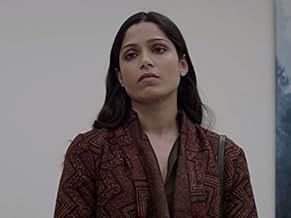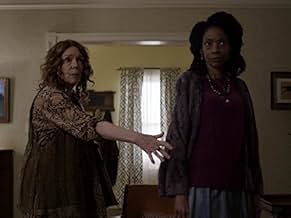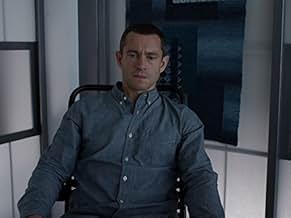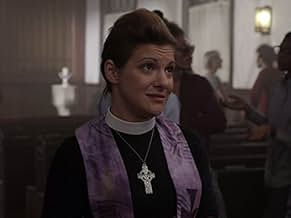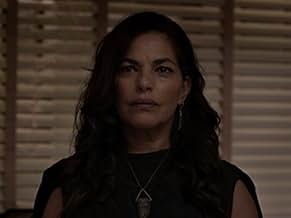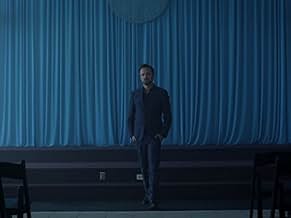Un hombre que se convierte en un seguidor de un grupo religioso sufre una crisis de fe.Un hombre que se convierte en un seguidor de un grupo religioso sufre una crisis de fe.Un hombre que se convierte en un seguidor de un grupo religioso sufre una crisis de fe.
- Premios
- 3 nominaciones en total
Explorar episodios
Opiniones destacadas
I found The Path to be a thought-provoking series that delves into themes of faith, religion, cult dynamics, and the struggles of breaking free from oppressive belief systems. While I appreciated the characters and the complex questions the series posed, there were significant flaws that hindered my overall enjoyment.
What I Liked: The series excels in exploring the psychological grip that cults can have on individuals and how belief systems shape people's identities. It prompted me to reflect on broader questions: Why do people stay in harmful systems? Can one separate a philosophy from its flawed founder? These are questions relevant not just to fictional movements like Meyerism but to real-world religions, ideologies, and even cultural icons.
My favorite character was Cal Robertson, played brilliantly by Hugh Dancy. He embodied the charisma and inner turmoil of a cult leader in a compelling way. I also appreciated the evolution of his relationship with Mary-it was one of the few character arcs that felt authentic and well-developed.
What I Disliked: Unfortunately, the series often relied on unnecessary drama and improbable situations. Relationships were especially frustrating, with characters falling in and out of love at a dizzying pace. Eddie (Aaron Paul) and Sara's dynamic, in particular, felt inconsistent and contrived, as did Hawk and Caleb's relationship. Transitions between major plot points also lacked plausibility; for instance, Eddie's abrupt rise to leadership or the sudden shifts in Sara and Cal's status within the movement felt unearned.
Another major issue was the lack of strong character consistency. Eddie begins as a skeptic, but when he gains power, he exhibits little empathy for those experiencing the same doubts he once had. This made him less relatable as the series progressed.
The ending was the biggest disappointment. It left too many loose ends and failed to provide satisfying resolutions to the themes and character arcs. It felt rushed, as if the creators had run out of steam and just wanted to wrap things up.
Broader Reflections: The show has clear parallels to real-life movements, particularly the Rajneesh movement led by Osho. Like Steven Meyer in the series, Osho preached a philosophy that resonated with many, yet his personal actions undermined his ideals. This raises an ethical dilemma: Is it acceptable to embrace a philosophy or movement if its founder was deeply flawed? Similarly, can we enjoy art by creators like Michael Jackson or Bill Cosby while acknowledging their moral failings?
This tension is mirrored in the characters' choices. Should Eddie, Sara, and Cal continue Meyerism despite knowing its origins? The series invites viewers to wrestle with these questions, even if it doesn't offer clear answers.
Final Thoughts: While The Path had its moments of brilliance and strong performances-particularly from Hugh Dancy-it was let down by uneven writing and unsatisfying resolutions. The show shines when it focuses on moral and philosophical dilemmas but stumbles with melodrama and weak plotting. My overall score is 7/10, with most of the points earned for its ambitious themes and thought-provoking questions.
What I Liked: The series excels in exploring the psychological grip that cults can have on individuals and how belief systems shape people's identities. It prompted me to reflect on broader questions: Why do people stay in harmful systems? Can one separate a philosophy from its flawed founder? These are questions relevant not just to fictional movements like Meyerism but to real-world religions, ideologies, and even cultural icons.
My favorite character was Cal Robertson, played brilliantly by Hugh Dancy. He embodied the charisma and inner turmoil of a cult leader in a compelling way. I also appreciated the evolution of his relationship with Mary-it was one of the few character arcs that felt authentic and well-developed.
What I Disliked: Unfortunately, the series often relied on unnecessary drama and improbable situations. Relationships were especially frustrating, with characters falling in and out of love at a dizzying pace. Eddie (Aaron Paul) and Sara's dynamic, in particular, felt inconsistent and contrived, as did Hawk and Caleb's relationship. Transitions between major plot points also lacked plausibility; for instance, Eddie's abrupt rise to leadership or the sudden shifts in Sara and Cal's status within the movement felt unearned.
Another major issue was the lack of strong character consistency. Eddie begins as a skeptic, but when he gains power, he exhibits little empathy for those experiencing the same doubts he once had. This made him less relatable as the series progressed.
The ending was the biggest disappointment. It left too many loose ends and failed to provide satisfying resolutions to the themes and character arcs. It felt rushed, as if the creators had run out of steam and just wanted to wrap things up.
Broader Reflections: The show has clear parallels to real-life movements, particularly the Rajneesh movement led by Osho. Like Steven Meyer in the series, Osho preached a philosophy that resonated with many, yet his personal actions undermined his ideals. This raises an ethical dilemma: Is it acceptable to embrace a philosophy or movement if its founder was deeply flawed? Similarly, can we enjoy art by creators like Michael Jackson or Bill Cosby while acknowledging their moral failings?
This tension is mirrored in the characters' choices. Should Eddie, Sara, and Cal continue Meyerism despite knowing its origins? The series invites viewers to wrestle with these questions, even if it doesn't offer clear answers.
Final Thoughts: While The Path had its moments of brilliance and strong performances-particularly from Hugh Dancy-it was let down by uneven writing and unsatisfying resolutions. The show shines when it focuses on moral and philosophical dilemmas but stumbles with melodrama and weak plotting. My overall score is 7/10, with most of the points earned for its ambitious themes and thought-provoking questions.
I binge-watched this from beginning to end (s02 e13). I was fascinated at the beginning, learning the story of this particular "movement". The entire first season developed well, was entertaining, suspenseful, and I looked forward to each new episode. Things were revealed and the actors portrayed the characters well. It was a pleasure to see Aaron Paul again; this even seemed like an adult version of Jesse Pinkman. His Eddie has a mysterious past and some of his emotional reactions reminded me of his former character. It was believable and things were moving along well.
Then came season 2. As it progressed, problems with the story and actors emerged. Cal was the worst, and I thought his portrayal unraveled when I noticed that he reacted the same way to every situation. A scene opens, Cal sees or learns something, and we see panic and a brain moving almost out of control. Even when he states a fact he seems to lie. I don't understand how these people could trust & follow him. All his head and eye movements screamed DECEPTION, in every scene and situation. It would have been more authentic if the actor had added some variety to his character; even just a wee bit of development would have been applauded. But man, he could have seamlessly stepped from the pilot episode to the season 2 finale in the same workday. You could wind him up like a toy robot and there he would go, head jerking about, eyes avoiding & searching, stammering, etc. It got real old.
Ditto for Eddie. At first, I understood his character and how he played him. Season 2, though, it seemed that he had the same facial reactions in just about every situation. Good news, bad news, nice conversation, threatening conversion, and we got the same thing. Opens his mouth a little, rolls his tongue into his lower cheek, turns his head, looks down, looks up, then utters some disappointing line. Episode after episode of this. You could turn it into a drinking game. Will he look up or down after sticking his tongue in his cheek and turning his head?
After interesting developments in season one, season two started telling us circular stories. All the main characters went through some stressing event or situation; they changed, the story turned, then somehow they're right back in their original "configuration". Sarah was the worst. Her motivations & feelings would change almost from scene to scene. She trusts Eddie, she hates him. She trusts Cal, she can't believe what he did, trusts him again, turns to Eddie, back to Cal, etc. Some scenes I couldn't understand why she was frowning instead of smiling. I'm not spoiling anything here. It gets difficult to follow because it appears that the characters, their motivations, their subsequent actions, are almost random. Did the script writers draw all these things blindly out of a bowl? I had to consult a TV script service to make sense of certain scenes. Why, why, why? Hawks feelings toward Eddie lack logic and are on a merry-go-round. You never know what you'll get.
Lastly, if this is a movement based on truth, transparency, and The Light, why are people cussing so profusely? Are they members of a faith movement or drunks in a pool hall? There are so many lies among these people you'd think they were double-agents involved in counter- espionage. Why would any "believer" fall for their numb explanations of odd events? And it didn't get better. When the loopy lunacy mercifully ended with episode 13, I was relieved. Not because anything plot-wise was resolved or satisfied, but because I need at least a year's break before considering watching a subsequent episode.
Then came season 2. As it progressed, problems with the story and actors emerged. Cal was the worst, and I thought his portrayal unraveled when I noticed that he reacted the same way to every situation. A scene opens, Cal sees or learns something, and we see panic and a brain moving almost out of control. Even when he states a fact he seems to lie. I don't understand how these people could trust & follow him. All his head and eye movements screamed DECEPTION, in every scene and situation. It would have been more authentic if the actor had added some variety to his character; even just a wee bit of development would have been applauded. But man, he could have seamlessly stepped from the pilot episode to the season 2 finale in the same workday. You could wind him up like a toy robot and there he would go, head jerking about, eyes avoiding & searching, stammering, etc. It got real old.
Ditto for Eddie. At first, I understood his character and how he played him. Season 2, though, it seemed that he had the same facial reactions in just about every situation. Good news, bad news, nice conversation, threatening conversion, and we got the same thing. Opens his mouth a little, rolls his tongue into his lower cheek, turns his head, looks down, looks up, then utters some disappointing line. Episode after episode of this. You could turn it into a drinking game. Will he look up or down after sticking his tongue in his cheek and turning his head?
After interesting developments in season one, season two started telling us circular stories. All the main characters went through some stressing event or situation; they changed, the story turned, then somehow they're right back in their original "configuration". Sarah was the worst. Her motivations & feelings would change almost from scene to scene. She trusts Eddie, she hates him. She trusts Cal, she can't believe what he did, trusts him again, turns to Eddie, back to Cal, etc. Some scenes I couldn't understand why she was frowning instead of smiling. I'm not spoiling anything here. It gets difficult to follow because it appears that the characters, their motivations, their subsequent actions, are almost random. Did the script writers draw all these things blindly out of a bowl? I had to consult a TV script service to make sense of certain scenes. Why, why, why? Hawks feelings toward Eddie lack logic and are on a merry-go-round. You never know what you'll get.
Lastly, if this is a movement based on truth, transparency, and The Light, why are people cussing so profusely? Are they members of a faith movement or drunks in a pool hall? There are so many lies among these people you'd think they were double-agents involved in counter- espionage. Why would any "believer" fall for their numb explanations of odd events? And it didn't get better. When the loopy lunacy mercifully ended with episode 13, I was relieved. Not because anything plot-wise was resolved or satisfied, but because I need at least a year's break before considering watching a subsequent episode.
With Actors Lke Aaron Paul & Hugh Dancy The Path builds one hell of a foundation for seasons to come. It demonstrates the potential to grow deeper and more rewarding as it matures, like any drama Katims has been associated with. The Path begins with Eddie already suspicious of his faith, following an encounter with a defector and his own personal revelations about the group's leadership following a trip to a healing center in Peru. In the episodes that follow, a great deal of the dialogue centers on his uncertainty in relation to whether or not to defect himself. It's a big decision, to be sure, but the writing offers little in the way of nuance or original ideas each time Eddie is volleyed back and forth between the spiritual and philosophical certainty of Meyerism and the depressing yet liberating instability of "the real world." The Path is unfortunately content to focus on a variety of rote melodramatic byways that give little insight into the fight between faith and personal desire, or the psychological relief and societal bliss that believers expect from their chosen religions.
As a couple who got out of a cult like scenario ourselves, my husband and I like certain aspects of this show and dislike others. Having been in a similar situation with a "religion", we relate to the two main characters a lot. However, there's various details about the show that irritate us on a logical level. Certain decisions characters make simply don't make sense at times if we are to believe they really are/were super into "the movement". Certain scenes don't make sense with the flow of the show too (especially a few of the random sex scenes in random places - and that's coming from people who are not offended by sex scenes, these ones just happened to be very weird in terms of placement in the show). Overall, the various plot lines and characters are gripping enough to carry the show and hold your attention, flaws and all. I see this as a mid to high 6 when compared to other shows we enjoy and rounded it up. We did get sucked in enough to finish season one and will watch season two when it comes out.
Yes, Cal looks and acts like a nervous chihuahua. Yes, Eddie whispers 90% of his lines. Yes, Sara's wardrobe was borrowed from Karen Carpenter's closet. But I can't stop watching this damn show! Maybe it's the anticipation of the ridiculous plot twists. Maybe it's my desire to watch the whole cult implode. Idk. Season 3 is an improvement over 2, which just got too random and weird. Kinda like this review.
¿Sabías que…?
- TriviaDirector Mike Cahill brought a distinct visual style to the filming, using only natural light and three cameras to create a spiritual feel - a style he dubbed "epic verite."
Selecciones populares
Inicia sesión para calificar y agrega a la lista de videos para obtener recomendaciones personalizadas
- How many seasons does The Path have?Con tecnología de Alexa
- What are IS people?
Detalles
- Fecha de lanzamiento
- País de origen
- Sitio oficial
- Idioma
- También se conoce como
- Путь
- Locaciones de filmación
- Productoras
- Ver más créditos de la compañía en IMDbPro
- Tiempo de ejecución1 hora
- Color
- Mezcla de sonido
- Relación de aspecto
- 16:9 HD
Contribuir a esta página
Sugiere una edición o agrega el contenido que falta

Principales brechas de datos
What was the official certification given to The Path (2016) in Australia?
Responda






